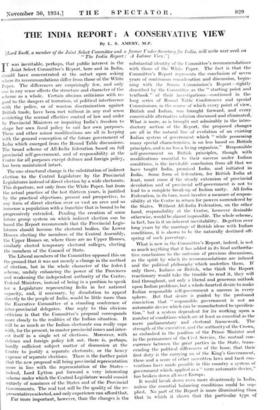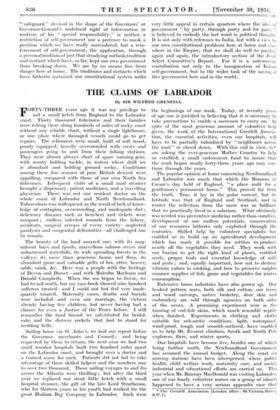THE INDIA. REPORT : A CONSERVATIVE VIEW
By L. S. AMERY, M.P.
[Lord Snell, a member of the Joint Select Committee and a former Under-Seeretary for India, will write next week on " The India Report : A Labour riew."1 IT was inevitable, perhaps, that public interest in the Joint Select Committee's Report, here and in India, should have concentrated at the outset upon asking where its recommendations differ from those of the White Paper. The differences are surprisingly few, and only one in any sense affects the structure and character of the scheme as a whole. Certain obvious criticisms with re- gard to the dangers of terrorism, of political interference with the police, or of wanton discrimination against British trade, have been. met without -in any real sense restricting the normal effective control of law and order by Provincial Ministers or impairing India's freedom to shape her own fiscal policy to suit her own purposes. These and other minor modifications are all in keeping With the general conception of the future government of India which emerged from the Round Table discussions. The broad scheme of All-India federation based on full provincial self-government, and of responsibility at the Centre for all purposes except defence and foreign policy, has been maintained intact.
The one structural change is the substitution of indirect election to the Central Legislature by the Provincial Legislatures instead of direct election by a wide electorate. This departure, not only from the White Paper, but from the actual practice of -the last thirteen years, is justified by the practical objections, present and prospective, to any form of direct election over so vast an area and so immense a population with a franchise that is bound to be progressively extended. Pending the creation of some future group system on which indirect election can be based the Report recommends that the Provincial Legis- latures should become the electoral bodies, the Lower Houses electing the members of the Central Assembly, the Upper Houses or, where there are no Upper Houses, similarly elected temporary electoral colleges, electing the members of the Council of State.
The Liberal members of the Committee opposed this on the ground that it was not merely a change in the method of election, but in the whole character of the feder 1 scheme, unduly enhancing the power of the Provinces and weakening the independent authority of the Centre. Federal Ministers, instead of being in a position to speak for a Legislature representing India in her national capacity, and, if necessary, by dissolution to appeal directly to the people of India, would be little more than the Executive Committee of a standing conference of inter-provincial delegates. One reply to this obvious criticism is that the Committee's proposal corresponds more closely to the realities of the Indian situation. It will be as much as the Indian electorate can really cope with, for the present, to master provincial issues and inter- est itself in a single set of elections. Moreover, with defence and foreign policy left out, there is, perhaps, hardly sufficient subject matter of discussion at the Centre to justify a separate electorate, or the heavy expense of separate elections. There is the further point that the new proposal will bring provincial representation more in line with the representation of the States— indeed, Lord Lytton put forward a very interesting scheme under which the Central Legislature would consist entirely of nominees of the States and of the Provincial Governments. The real test will be the quality of the re- presentatives selected, and only experience can afford that: Far More important, however, than the changes is the substantial identity of the CoMmittee's recommendations with those of the White Paper. The fact is that the Committee's Report represents the- conclusion of seven years of continuous consideration and discussion, begin- ning with the Simon Commission's Report—rightly described by the Committee as the " starting point and textbook " of their investigations—continued in the long series of Round Table Conferences and special Commissions, in the course of which every point of view, British and Indian, was brought forward, and every conceivable alternative solution discussed and eliminated. What is more, as is brought out admirably in the intro- ductory section of the Report, the proposed changes are all in the natural line of evolution of an existing Indian system of government which " while possessing many special characteristics, is no less based on British principles, and is no less a living organism." Responsible self-government on British principles, though with modifications essential to their success under Indian conditions, is the inevitable conclusion from all that we have taught India, promised India, and initiated in India. Some -form of federation, for British India at least, must come if the steady extension of provincial devolution and of provincial self-government is not to lead to a complete break-up of Indian unity. All-India Federation, in its turn, must involve a measure of respon- sibility at the Centre in return for powers surrendered by the States. Without All-India Federation, on the other hand, responsibility at the Centre, however desirable otherwise, would be almost impossible. The whole scheme, in fact, has in it an inherent inevitability. Begotten over long years by the marriage of British ideas with Indian conditions, it is shown to be the naturally destined off- spring of such parentage.
. What is new in the C'ommittee's Report, indeed, is not so much anything that it has added in its final authorita- tive conclusions to the outcome of previous discussions, as the spirit by which its recommendations arc infused and the political philosophy which underlies them. If only those, Indians or British, who think the Report reactionary would take the trouble to read it, they will find throughout, not only a liberal and generous outlook upon Indian problems, but a whole-hearted desire to make Indian responsible self-government a success in every sphere. But that desire is guided by the profound conviction that " responsible government is not an automatic device which can be manufactured to specifica- tion," but a system dependent for its working upon a number of conditions which arc at least as essential as the mere parliamentary and electoral framework. The Strength of the executive, and the authority of the Crown, as embodied in the position of the Prime Minister and in the permanence of the Civil Service, the mutual con- currence between the great parties in the State, trans- cending the political differences of the hour, that their first duty is the carrying on of the King's Government, these and a score of other unwritten laws and tacit con- ventions have made possible in this country a system of government which, applied as a " mere automatic device," has broken down all over Europe.
It would break down even more disastrously in India, unless the essential balancing conditions could be sup- plied. No part of the Report is more illuminating than that in which it shows that the particular type of " safeguard " devised in the shape of the Governors' or Governor-General's undefined right of intervention in matters of his " special responsibility," is neither a restriction of self-government nor a pretence to mask a position which we have really surrendered, but a rein- f- ceinent of self-government, the application, through a personal medium,of just that steadying outlook,tradition and instinct which have, so far, kept our own government from breaking down. We are by no means free from danger here at home. The traditions and instincts which have hitherto sustained our constitutional system make very little appeal in certain quarters where the idea of government " by party, through party and for party is believed to embody the last word in political thought. It is not only with reference to India, but with a view to our own constitutional problems here at home and else- where in the Empire, that we shall do well to ponder, again and again, the introductory section of the Joint Select Committee's Report. For it is a noteworthy contribution not only to the inauguration of Indian self-government, but to the wider task of the saving of free government here and in the world.











































 Previous page
Previous page